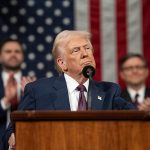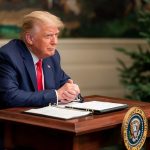It seems the Chinese Communist Party has gotten a bit too comfortable in their global economic dominance, and Australia’s latest response to their overtures is proof that some nations aren’t ready to surrender to Beijing’s whims. News reports reveal that Australia, under the leadership of Deputy Prime Minister Richard Marles, has flatly rejected China’s attempts to collaborate on easing the tariffs slapped down by President Trump. The rejection was as decisive as it was amusing—like Australia saying, “Thanks, but no thanks” to a dinner invitation from the neighborhood bully.
China’s bid for a unified front against Trump’s tariffs seemingly fell on deaf ears across the Tasman Sea. Instead of a warm reception, Australia delivered a clear message: they are not about to climb into bed with the Chinese government. The Australian PM’s sentiments come straight from the playbook of a nation that understands the value of standing on principle rather than folding under pressure. This is a clear indication that Australia recognizes the geopolitical implications of aligning itself with a regime that continues to belch out human rights violations while engaging in economic espionage.
One might wonder about the sheer audacity of China, which relies on Australia for a substantial chunk of its resource intake. In 2023, nearly one-third of Australian exports found their way to China, totaling a whopping $219 billion. Despite this economic interdependence, Australia seems to value its sovereignty more than a fleeting trade agreement with a nation notorious for its backstabbing tactics. This gesture not only demonstrates Australia’s independence from China’s looming shadow but also raises eyebrows about what China might be fearing. Is it possible that Beijing sees cracks in its dominance, sparking desperation as they brace for the continued isolation brought on by American economic policies?
China's Trade Overture Snubbed: Aussies Refuse to Make 'Common Cause'
There are signs that China is beginning to worry about being economically isolated. https://t.co/URl5jGg4DL
— Bart Marcois (@bmarcois) April 12, 2025
While Australia’s PM Anthony Albanese isn’t exactly rolling out the red carpet for Trump’s tariffs—claiming they lack “a basis in logic”—his government’s unwillingness to retaliate in favor of bowing down to China is commendable. It’s not every day a nation tells its most significant trading partner to take a hike, demonstrating that Australia’s priorities lean towards maintaining a stable and independent market rather than succumbing to threats. After all, why should Australia risk its economic future by compromising its relationships with allies like the U.S. just because China throws a trade tantrum?
The looming question, however, is what China plans to do next. With the United States holding the economic lion’s share of the global market, no one should be surprised if they start scrambling to secure alliances as they begin to realize their world view might be at odds with reality. Instead of pursuing Western nations through diplomatic overtures, perhaps Beijing should take a long, hard look in the mirror and consider fundamental changes to their trade practices—the kind that involves respecting intellectual property and playing fair.
It all adds up to one undeniable conclusion: Australia’s refusal to partner up with China during this tense economic moment signifies more than just a rejection of an overture; it signals a broader trend among nations wary of entering into deals with the Chinese regime. With the U.S. leading the charge to isolate China on the world stage, it’s clear that free nations like Australia will continue to fight for their independence in the face of tyrannical economic coercion, no matter the tempting offers on the table.




